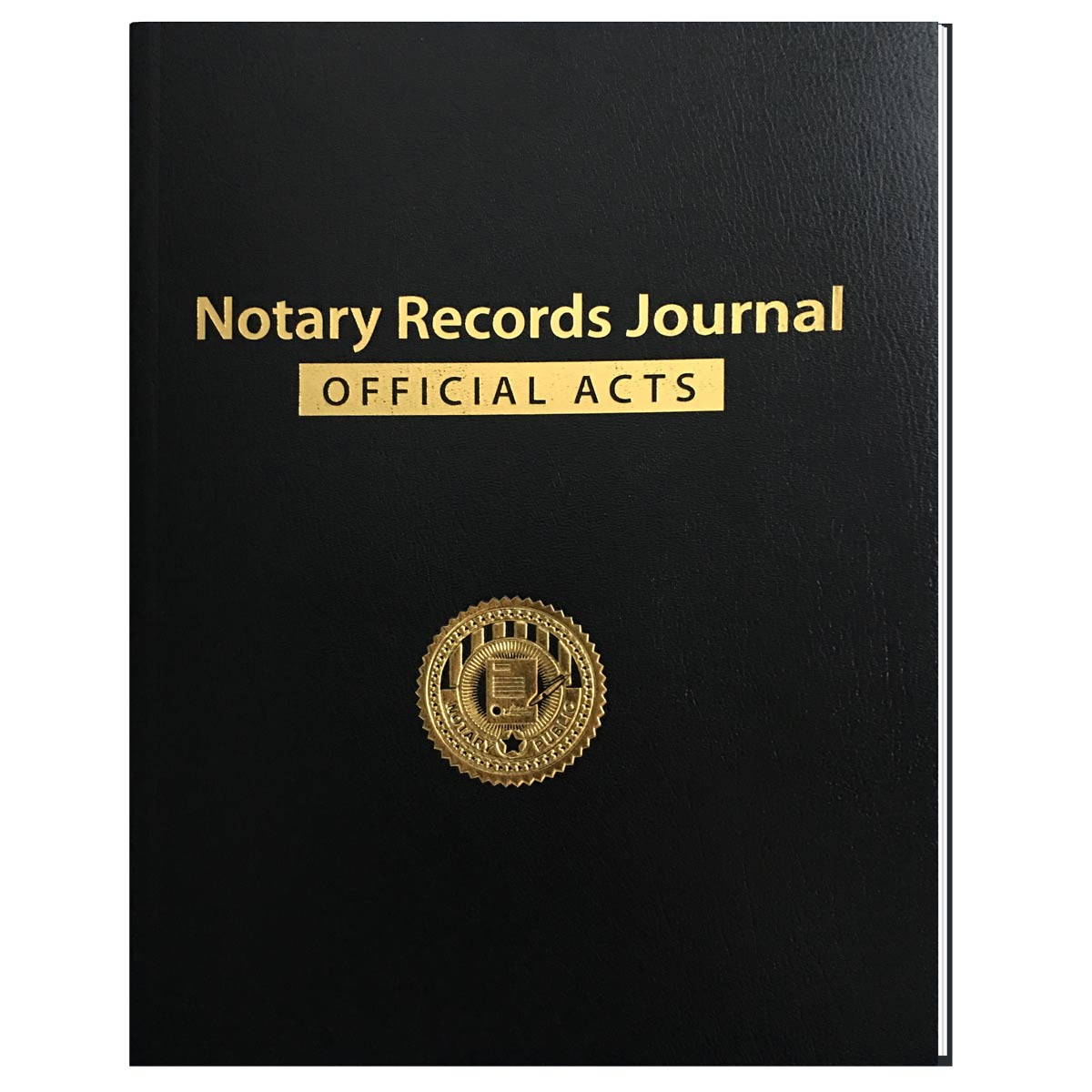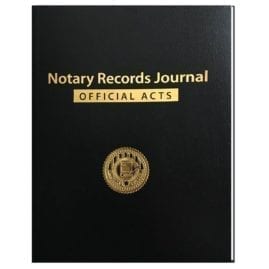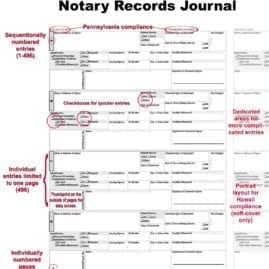Pennsylvania Notary Journal Requirements

Notaries commissioned in Pennsylvania are required to maintain a notary journal, also called a notary ledger or notary register. Notaries must record all notarial acts that the Notary performs in their journal in chronological order.
Notaries can keep a physical journal (think notebook) or an electronic journal. Notaries in Pennsylvania can keep a physical/tangible journal in addition to an electronic journal.
ALL of our Notary journals match and exceed the Pennsylvania journal requirements. You may purchase your Pennsylvania Notary journal here.
Tangible Journal Requirements
A tangible Notary journal must be bound together, and the pages of the journal must be numbered.
Electronic Journal Requirements
Electronic journals have to be located in a secure, “tamper-evident” file.
Pennsylvania Notary Journal Entry Requirements
Journal entries should be made at the same time as the notarial act. Notary journal entries are required to contain ALL of the following:
- The date and time of the notarial act
- The type of notarial act (jurat, acknowledgment, etc.)
- A description of the record
- The full name of each person for whom the notarial act is performed
- The full address of each person for whom the notarial act is performed
- If identity of the person is based on personal knowledge, the Notary must state this in their journal
- If identity of the person is based on satisfactory evidence, the Notary must include “a brief description of the method of identification and any identification credential presented, including the date of issuance and expiration of an identification credential.”
- The fee charged for the notarial act.
Additional Journal Requirements
The Pennsylvania Department of State says: “A notary journal may not contain any personal financial or identification information about the notary’s clients, such as complete Social Security numbers, complete drivers’ license numbers or complete account numbers. Terminal numbers for these types of numbers, including the last four digits of a Social Security number, may be used to clarify which individual or account was involved.” (dos.pa.gov)
In sum, this means that a Notary journal cannot contain any complete personal financial or identification information about the Notary’s clients. However, terminal numbers – the last four digits of their Social Security card or account numbers – can be used for identification.
If your Notary journal is lost or stolen, you must notify the Pennsylvania Department of State within 15 days from the date you discovered the loss. The Notary can choose to file a police report for the stolen journal.
You can use this form Report of Loss Theft of Notary Equipment form 2019.pdf to report the loss or theft of your journal.
When you retire as a Notary in Pennsylvania, you must send your journal to your county’s office of the recorder of deeds within 30 days of your retirement.
You are required by law to send your journal to the county recorder if:
- You resign your Notary commission
- Your commission is revoked
- Your commission expires, unless you apply for a new Notary commission before your commission ends
- Death or “adjudication of incompetency” of a current or former Notary
Your Notary journal is your exclusive property.
A Notary journal cannot be used by anyone other than the Notary Public. A journal cannot be surrendered to an employer when the employee terminates their employment.
Notary Journal Inspection
A Notary Public may permit inspection of a specific journal entry to any person requesting to view an entry. See the state guidelines below:
“A notary public can prove that a notarial act took place by supplying a certified copy of the journal entry. To make a certified copy of an entry in the journal, the notary public reproduces the page and attaches a certificate stating, “I certify that this is a true and correct copy from my official journal in my possession.” The reproduction should be a photocopy of the entire register page containing the entry in question. A notary must give a certified copy of the journal to a person that applies for it. Requests may, but are not required to be, in writing. The notary public shall provide the certified copy within 10 days of receipt of the request. The notary may charge reasonable fees for copying and postage, but the requestor should be advised in advance of these fees. If the scope of the request is not clear, the notary may offer to have the requester inspect the journal at the notary’s office to identify the specific pages or dates that the requester is seeking. A request for inspection or certified copies of a notary journal made through an investigative request by law enforcement or by the Department or in a subpoena in the course of criminal or civil litigation must be complied with in the manner specified in the request or subpoena.”
Pennsylvania Notary Journal Example

-

 Select options This product has multiple variants. The options may be chosen on the product pageQuick ViewAlabama, Alabama Notary Journals, Alaska, Alaska Notary Journals, Arizona, Arizona Notary Journals, Arkansas, Arkansas Notary Journals, California, California Notary Journals, Colorado, Colorado Notary Journals, Connecticut, Connecticut Notary Journals, Delaware, Delaware Notary Journals, District of Columbia, Florida, Florida Notary Journals, Georgia, Georgia Notary Journals, Hawaii, Hawaii Notary Journals, Idaho, Idaho Notary Journals, Illinois, Illinois Notary Journals, Indiana, Indiana Notary Journals, Iowa, Iowa Notary Journals, Kansas, Kansas Notary Journals, Kentucky, Kentucky Notary Journals, Louisiana, Louisiana Notary Journals, LTBB, Maine, Maine Notary Journals, Maryland, Maryland Notary Journals, Massachusetts, Massachusetts Notary Journals, Michigan, Michigan Notary Journals, Minnesota, Minnesota Notary Journals, Mississippi, Mississippi Notary Journals, Missouri, Missouri Notary Journals, Montana, Montana Notary Journals, Nebraska, Nebraska Notary Journals, Nevada, Nevada Notary Journals, New Hampshire, New Hampshire Notary Journals, New Jersey, New Jersey Notary Journals, New Mexico, New Mexico Notary Journals, New York, New York Notary Journals, North Carolina, North Carolina Notary Journals, North Dakota, North Dakota Notary Journals, Notary Journals, Ohio, Ohio Notary Journals, Oklahoma, Oklahoma Notary Journals, Oregon, Oregon Notary Journals, Pennsylvania, Pennsylvania Notary Journals, Rhode Island, Rhode Island Notary Journals, South Carolina, South Carolina Notary Journals, South Dakota, South Dakota Notary Journals, Tennessee, Tennessee Notary Journals, Texas, Texas Notary Journals, Utah, Utah Notary Journals, Vermont, Vermont Notary Journals, Virginia, Virginia Notary Journals, Washington, Washington D.C., Washington Notary Journals, West Virginia, West Virginia Notary Journals, Wisconsin, Wisconsin Notary Journals, Wyoming, Wyoming Notary Journals
Select options This product has multiple variants. The options may be chosen on the product pageQuick ViewAlabama, Alabama Notary Journals, Alaska, Alaska Notary Journals, Arizona, Arizona Notary Journals, Arkansas, Arkansas Notary Journals, California, California Notary Journals, Colorado, Colorado Notary Journals, Connecticut, Connecticut Notary Journals, Delaware, Delaware Notary Journals, District of Columbia, Florida, Florida Notary Journals, Georgia, Georgia Notary Journals, Hawaii, Hawaii Notary Journals, Idaho, Idaho Notary Journals, Illinois, Illinois Notary Journals, Indiana, Indiana Notary Journals, Iowa, Iowa Notary Journals, Kansas, Kansas Notary Journals, Kentucky, Kentucky Notary Journals, Louisiana, Louisiana Notary Journals, LTBB, Maine, Maine Notary Journals, Maryland, Maryland Notary Journals, Massachusetts, Massachusetts Notary Journals, Michigan, Michigan Notary Journals, Minnesota, Minnesota Notary Journals, Mississippi, Mississippi Notary Journals, Missouri, Missouri Notary Journals, Montana, Montana Notary Journals, Nebraska, Nebraska Notary Journals, Nevada, Nevada Notary Journals, New Hampshire, New Hampshire Notary Journals, New Jersey, New Jersey Notary Journals, New Mexico, New Mexico Notary Journals, New York, New York Notary Journals, North Carolina, North Carolina Notary Journals, North Dakota, North Dakota Notary Journals, Notary Journals, Ohio, Ohio Notary Journals, Oklahoma, Oklahoma Notary Journals, Oregon, Oregon Notary Journals, Pennsylvania, Pennsylvania Notary Journals, Rhode Island, Rhode Island Notary Journals, South Carolina, South Carolina Notary Journals, South Dakota, South Dakota Notary Journals, Tennessee, Tennessee Notary Journals, Texas, Texas Notary Journals, Utah, Utah Notary Journals, Vermont, Vermont Notary Journals, Virginia, Virginia Notary Journals, Washington, Washington D.C., Washington Notary Journals, West Virginia, West Virginia Notary Journals, Wisconsin, Wisconsin Notary Journals, Wyoming, Wyoming Notary JournalsNotary Records Journal
Price range: $22.95 through $28.95Notary Records Journal Features:
128 heavy weight pages
496 individually numbered entries (1-496)
Durable, high-quality construction
4 entries per page
Entries contained to one page (no page-spanning entries)
Convenient check boxes to speed up entries
Detailed areas…Select options This product has multiple variants. The options may be chosen on the product pageQuick View
Notary Records Journal
Our Notary Records Journal meets and exceeds all of the Pennsylvania journal requirements.




